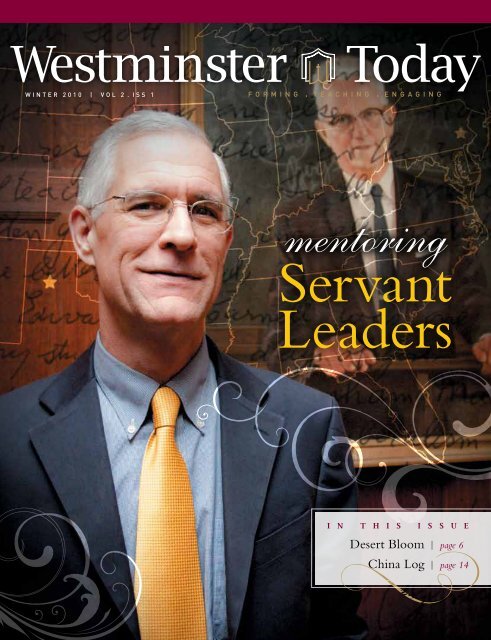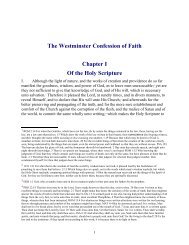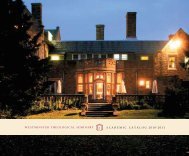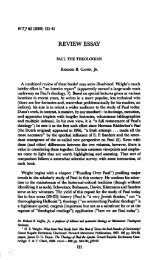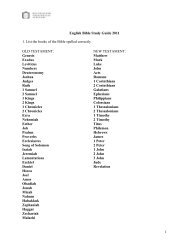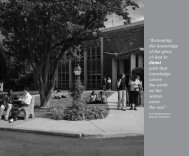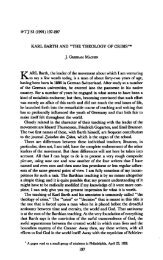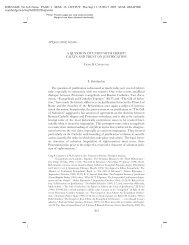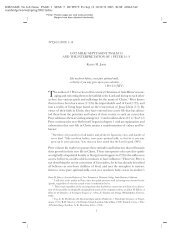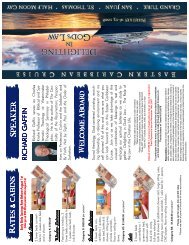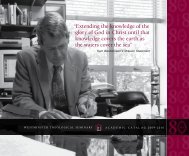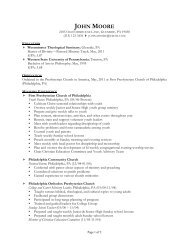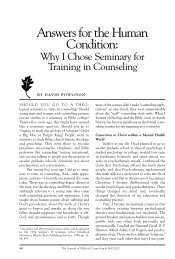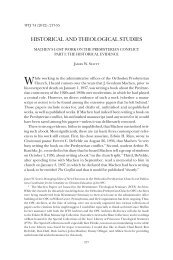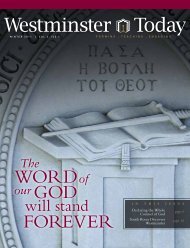Here - Westminster Theological Seminary
Here - Westminster Theological Seminary
Here - Westminster Theological Seminary
Create successful ePaper yourself
Turn your PDF publications into a flip-book with our unique Google optimized e-Paper software.
<strong>Westminster</strong><br />
Today<br />
W I N T E R 2 0 1 0 | v o l 2 . i s s 1<br />
f o r m i n g . t e a c h i n g . e n g a g i n g<br />
mentoring<br />
Servant<br />
Leaders<br />
i n t h i s i s s u e<br />
Desert Bloom | page 6<br />
China Log | page 14
Mentoring Servant Leaders<br />
Forming Specialists in the Bible<br />
Without fear of contradiction, Jesus<br />
is the greatest educator in history. His Great<br />
Commission declares, “Go and make disciples<br />
(learners) of all nations” (Matthew 28:19).<br />
The School of Christ is worldwide and eternal in character. People from every<br />
kindred, tribe, tongue and nation are included (Rev. 5:9). In the ages to come, we<br />
will still be learning of His grace (Eph. 2:6-7)!<br />
In obedience to Christ’s Great Commission, <strong>Westminster</strong> <strong>Theological</strong><br />
<strong>Seminary</strong> operates as a school of higher learning to train pastors, teachers and<br />
leaders for the Kingdom of Christ by Declaring the Whole Counsel of God. In the<br />
spirit of Christ’s gospel imperative, we seek to make lifelong learners of the<br />
unsearchable riches of God in Christ as revealed in the historic-redemptive selfdisclosure<br />
of God in the Scriptures. We have been doing that now for 80 years.<br />
Our living graduates and alumni, numbering well over 6,000, are serving in over<br />
60 countries around the globe.<br />
These have been consistently identif ied with what <strong>Westminster</strong> has<br />
cherished—high scholarship and depth of orthodox theology, which seeks to<br />
reflect Christ’s love and gospel service. Will you come and join our community<br />
of servant leaders and specialists in the Bible When you do, you will join our<br />
worldwide alumni who cherish and joyfully pursue the greatest commission ever<br />
given among men—to make learners of the saving and eternal gospel of Jesus<br />
Christ, the King of Kings and Lord of Lords.<br />
Sincerely in His Service,<br />
Peter A. Lillback,<br />
President<br />
2 | <strong>Westminster</strong> Today Winter 2010
<strong>Westminster</strong> Today<br />
President & publisher<br />
Peter A. Lillback, Ph.D. ’85<br />
Executive editor<br />
David B. Garner, Ph.D. ’02<br />
contents<br />
Managing editor<br />
J. Michael Cuzzolina, M.Div. ’05<br />
DESIGN<br />
Cause Design<br />
CONTRIBUTORS<br />
Chris Brown • J. Michael Cuzzolina<br />
Dr. William Edgar • Dr. Michael Emlet<br />
Jeremy Eshelman • Dr. David Garner • Dr. Jeff Jue<br />
Dr. Peter Lillback • Paul MacDonald<br />
Capt. Chad Montgomery • Jared Oliphint<br />
Dr. K. Scott Oliphint • Dr. Vern Poythress<br />
Jessica Remo • Patti Scherphorn • Dave Senior<br />
Dr. Carl Trueman • Rodd Whitney<br />
Dr. Timothy Witmer<br />
Photo Credits<br />
Chris Leaman<br />
Chris Leaman Photography<br />
(Chris@ChrisLeaman.com)<br />
Chae Chong – luxdei photography,<br />
(chaechong@gmail.com)<br />
http://luxdei.smugmug.com<br />
Ralf Augstroze Photography<br />
Subscriptions<br />
P.O. Box 27009<br />
Philadelphia, PA 19118<br />
1-800-373-0119<br />
www.wts.edu<br />
Editorial Office<br />
2960 Church Rd.<br />
Glenside, PA 19038<br />
215-572-3844<br />
Fax: 215-887-5651<br />
<strong>Westminster</strong>Today@wts.edu<br />
Permissions<br />
<strong>Westminster</strong> Today grants permission for<br />
any original article (not a reprint) to be<br />
photocopied for use in a local church or<br />
classroom, provided no more than 1,000<br />
copies are made, are distributed free and<br />
indicate <strong>Westminster</strong> Today as the source.<br />
WT is available at www.wts.edu/ezine<br />
© Copyright 2009<br />
<strong>Westminster</strong> <strong>Theological</strong> <strong>Seminary</strong><br />
Philadelphia, PA<br />
All Scripture references are from the English<br />
Standard Version unless otherwise noted.<br />
mission<br />
<strong>Westminster</strong> Today’s purpose is to highlight the<br />
<strong>Westminster</strong> difference in the unique way we<br />
are forming, teaching and engaging in light of<br />
our overarching mission “to form Christian<br />
leaders to proclaim the whole counsel of God<br />
throughout a changing world.”<br />
In any given year, <strong>Westminster</strong> students—<br />
coming from 100 denominations, 40 countries<br />
and 35 states—are being equipped to become<br />
ministers, missionaries, professors, writers, speakers<br />
and Christian workers worldwide.<br />
6<br />
features<br />
6<br />
11<br />
14<br />
Desert Bloom<br />
Nourishing <strong>Westminster</strong>’s Future<br />
Happy Birthday, John Calvin!<br />
A Tribute by Dr. William Edgar<br />
China Log<br />
Walking the World With President Lillback<br />
in every issue<br />
18<br />
19<br />
20<br />
21<br />
22<br />
23<br />
11 14<br />
Unity in Diversity<br />
<strong>Westminster</strong> Difference<br />
Investing in the Future<br />
<strong>Westminster</strong> Students<br />
Shared Stewardship<br />
Forming Pastors and Scholars<br />
Top 10<br />
<strong>Westminster</strong> Influence<br />
Class Notes<br />
<strong>Westminster</strong> Alumni<br />
Eternal Word, Changing World<br />
Excerpt from “The Shepherd Leader”<br />
On the cover:<br />
Dr. Oliphint poses with a portrait<br />
of his mentor, Cornelius Van Til.<br />
Cover Photo:<br />
Chae Chong/luxdei photography<br />
Look for this symbol to read more... at wts.edu/ezine<br />
www.wts.edu <strong>Westminster</strong> Today | 3
W E S T M I N S T E R V O I C E S<br />
“This is still true at my seminary!”<br />
The late Reverend Dr. Jake Eppinga, ThB 1943<br />
– LaGrave Avenue CRC, Grand Rapids, MI<br />
He hitchhiked from Illinois to Pennsylvania to visit <strong>Westminster</strong> at the encouragement of someone<br />
named Edmund Clowney. His last few miles to the seminary were provided by someone who picked<br />
up hitchhikers—a professor named Cornelius Van Til! The Reverend Dr. Eppinga said he would<br />
never forget the convocation message given by R. B. Kuiper, “Buy the truth and sell it not.” With joy<br />
in his heart, over 50 years later, Dr. Eppinga said, “This is still true at my seminary!”<br />
Why is good preaching so uncommon today<br />
W E S T M I N S T E R<br />
SPEAKS<br />
Part of the answer resides in a fundamental misunderstanding of<br />
what preaching is. Only as we recapture an understanding of the special nature of<br />
preaching can we hope to preach effectively.<br />
Picture two scenarios: First, a Sunday service—prayer is offered, hymns of<br />
praise are sung, the word is read—and, as the visiting preacher moves to leave<br />
his seat and go forward, the presiding pastor declares, “Okay, let’s break for a<br />
short time to charge up our coffee mugs. We’ll reconvene in 5 minutes for the sermon.”<br />
Second, a worship service during a conference—the worship leader stands up<br />
on the stage and introduces the preacher as follows: “And now it is time to hear<br />
from Rev. X, who is going to explain the Bible to us.”<br />
Both contexts reflect an understanding of the preacher’s task as primarily that of<br />
communicating information. The problem is that if preaching is simply a means for<br />
such communication, it is singularly poor.<br />
Listen to the words of English eighteenth century wit, Dr. Samuel Johnson, on<br />
the matter of lectures: “People nowadays got a strange opinion that everything should<br />
be taught by lectures. Now I cannot see that lectures can do so much as<br />
reading from books from which the lectures are taken.” Johnson’s point<br />
If information is what is sought, there are better means than sitting<br />
and listening to somebody else. But preaching is more than just<br />
transmission of information, it is the confronting of people with God.<br />
more... at wts.edu/ezine<br />
Rev. Dr. Carl R. Trueman, vice president for academic affairs and<br />
professor of historical theology and church history<br />
trueman: chae chong/luxdei photography<br />
4 | <strong>Westminster</strong> Today Winter 2010
Must READS<br />
As you mentor servant leaders in Christ, make<br />
time to read any or all of these along with them…<br />
poythress: chae chong/luxdei photography<br />
“Understanding apologetics as explicating,<br />
affirming, and vindicating Christianity<br />
in the face of uncertainty and skepticism.<br />
Edgar and Oliphint have skillfully selected<br />
the best pre-Reformation sources to<br />
introduce us to this ongoing task.”<br />
—J. I. Packer, Regent College<br />
“This reader on the classical traditions of<br />
Christian apologetics is, to my knowledge,<br />
unmatched in basic compendia.” —Max<br />
L. Stackhouse, Princeton <strong>Theological</strong> <strong>Seminary</strong><br />
“Bill Edgar, one of evangelicalism’s most<br />
valued scholars and apologists, has given us<br />
in this work with Scott Oliphint, a classic<br />
destined to be used for generations. I<br />
highly recommend it to all who are called<br />
to defend the faith.” —Chuck Colson,<br />
Founder, Prison Fellowship<br />
Order these<br />
and other<br />
Reformed books<br />
at great prices at<br />
wtsbooks.com!<br />
Dr. Emlet is well aware that Christians<br />
struggle with real life problems. And he<br />
believes the Bible offers divine wisdom<br />
for life’s challenges. “Thank you<br />
Michael Emlet for reminding us that<br />
we spend far too much time reducing<br />
the story of God’s redemption to a<br />
digest version, rather than opening all<br />
of Scripture to connect it to people as<br />
saints, sufferers and sinners.”<br />
—Rod Mays, National Coordinator,<br />
Reformed University Ministries<br />
“CrossTalk combines the best of Bible<br />
study methods, theology and counseling<br />
to help the sufferer, the sinner and the<br />
saint be radically transformed by Jesus.”<br />
—Mark Driscoll, Pastor of Mars Hill Church<br />
“God controls and specifies the meaning<br />
of each word—not only in English but<br />
in Mandarin Chinese, Hindi, Italian<br />
and every other language. When, in our<br />
modernism or postmodernism, we drop<br />
Him from our account of language, our<br />
words suddenly become a prison that<br />
keeps us from the truth, rather than<br />
opening doors to the truth.”<br />
—Author, Dr. Vern Poythress<br />
“The present book on language shows<br />
that the foundation of human speech is<br />
the speech between the Father, the Son<br />
and the Holy Spirit, so that without<br />
God meaningful language would be<br />
impossible.” —John M. Frame, WTS<br />
BDiv 1964, Reformed <strong>Theological</strong> <strong>Seminary</strong><br />
VISIT WWW.CCEF.ORG FOR FREE COUNSELING RESOURCES AND TO<br />
EXPLORE THEIR COUNSELING AND EDUCATIONAL MINISTRIES.<br />
Dr. Vern Poythress is professor of New Testament interpretation<br />
at <strong>Westminster</strong> <strong>Theological</strong> <strong>Seminary</strong>, Philadelphia. He holds<br />
degrees from California Institute of Technology (BS, 1966),<br />
Harvard University (PhD, 1970), <strong>Westminster</strong> (MDiv, Th.M.,<br />
1974), University of Cambridge (MLitt, 1977) and University of<br />
Stellenbosch (DTh, 1981). A former professor of mathematics at<br />
Fresno State College, and instructor at the Summer Institute of<br />
Linguistics, he joined <strong>Westminster</strong>’s faculty in 1976. In addition<br />
to numerous journal articles and essays, he is the author of<br />
many books including Symphonic Theology, Understanding<br />
Dispensationalists and God-Centered Biblical Interpretation.<br />
www.wts.edu <strong>Westminster</strong> Today | 5
Like colorful, colossal blossoms sprouting<br />
from the parched desert, the Cadillac<br />
Ranch sculpture has encouraged the<br />
Amarillo landscape since 1974.
A conversation with K. Scott Oliphint, PhD, professor of<br />
apologetics and systematic theology, reveals a lesson in providence<br />
surrounding how he met Cornelius Van Til and that there are fewer<br />
desert<br />
miles between <strong>Westminster</strong> and Amarillo, Texas than you’d think<br />
BLOOM<br />
Desert ground: jeff strickler/istock; cadillac ranch: David Wilbanks<br />
MN o u r i s h i n g W e s t m i n s t e r ’ s F u t u r e<br />
y coming to Reformed theology and the Orthodox<br />
Presbyterian church were on two separate tracks<br />
that providentially merged. I had become a Christian out<br />
of high school, and in college I began taking a philosophy<br />
course from a Christian philosophy instructor at West<br />
Texas State University. During that time, in the fall of 1977,<br />
Christianity Today did a cover article on Cornelius Van Til. At that<br />
point, I had been reading Francis Schaeffer, and this philosophy<br />
class also required some Schaeffer reading. In the Christianity<br />
Today article, I read that Van Til had taught Schaeffer. I thought,<br />
I might as well read the guy that taught the guy that I’ve been<br />
reading. I went down to the local bookstore with the title,<br />
Defense of the Faith. The guy said, “I’ve never heard of it.” He<br />
looked it up and couldn’t find it. Finally, he gets out the big<br />
tome, Books In Print. He says, “Oh yeah, here it is. South New<br />
Jersey. It’ll take a month to get here.” I was probably the only<br />
guy who paid full price for that book. I couldn’t wait to get it.<br />
Van Til’s visit with Oliphint<br />
in Amarillo in 1980<br />
www.wts.edu <strong>Westminster</strong> Today | 7
The wilderness and the dry land shall be glad; the desert shall rejoice and blossom like<br />
Also during this time I was on Young Life staff, and my Young<br />
Life mentor was David Brack, who is now pastor of Christ<br />
Covenant Presbyterian Church and a trustee of <strong>Westminster</strong>.<br />
Brack and I were leading Young Life clubs, which is how I got<br />
interested in apologetics; I was doing evangelism in Young Life<br />
with unbelievers, and so I was getting questions that I wasn’t<br />
equipped to handle. One thing led to another and I found out<br />
that apologetics deals with some of these questions. My interest<br />
in Schaeffer led to interest in Van Til by way of Young Life.<br />
After it arrived, I started poring over it. Obviously, I<br />
didn’t get all of it at once. I would take it to my philosophy<br />
professor, and we’d sit over coffee and I’d say “Read this and<br />
tell me what it means.” And he’d say, “I’m not sure what<br />
that means.” Now I’m in a quandary. I look on the back<br />
of the book and it says <strong>Westminster</strong> <strong>Seminary</strong>, P.O. Box<br />
27009. And so I write <strong>Westminster</strong>: “I’m really wondering<br />
if it is possible to ask Van Til any questions, because I’m out<br />
here in Amarillo and no one is able to help me.” They send<br />
me a little note saying, “Van Til is just retired and he’s happy<br />
to get mail and here is his address”—and I’ll never forget<br />
it—“16 Rich Avenue, Flourtown, PA 19118.”<br />
I wrote him a letter: “You know I’m really struggling<br />
with some of the things you’re saying here. This is great<br />
stuff, but what do you mean by this, this and this…”A<br />
week later pages torn out of a spiral notebook came in a<br />
handwritten envelope. “<strong>Here</strong>’s what I’m saying, please<br />
write anytime…” His wife had just recently died and he<br />
wrote, “I’m retired, and I have plenty of time.”<br />
I wrote about once per week for a while. I’d be reading<br />
along and I’d say, “I don’t get it.” He’d write back, “<strong>Here</strong>’s<br />
what I mean…” He would start articulating things, but at<br />
that point he was up in years, so one thing would lead to<br />
another in his own mind. I’d have to begin to interpret his<br />
letters like his writings.<br />
Oliphint brings Van Til to<br />
David Brack—and Young Life…<br />
So, I am working on a Young Life talk around Easter. This<br />
was a weekly talk we gave to non-Christians. Brack stops by<br />
and says, “Why don’t you do something on Josh McDowell’s<br />
Evidences of the Resurrection” And I say, “I don’t think I can<br />
do that.” He looks at me like I had flipped out. He was just<br />
leaving the office and he says, “We’ve got to talk about this.”<br />
And all I can say is, “Okay.” I did my talk. It was not on<br />
anything from Josh McDowell.<br />
A week goes by and he says, “What’s the deal” I say, “Well,<br />
I’ll tell you what I know right now. This is the deal: We’re in<br />
the business of communicating the gospel. I don’t think what<br />
I’ve been saying is true to what the gospel is. <strong>Here</strong> are some of<br />
the problems...” I started to lay it out. For me it had to do with<br />
the authority of Scripture. It wasn’t just Five Points, even though<br />
that had something to do with it. It was a bigger picture of the<br />
I wrote him a letter: “You know I’m<br />
really struggling with some of the<br />
things you’re saying here. This is great<br />
stuff, but what do you mean by this,<br />
this and this…”<br />
oliphint: chae chong/luxdei photography<br />
8 | <strong>Westminster</strong> Today Winter 2010
the crocus;… 2 They shall see the glory of the LORD, the majesty of our God. Isaiah 35:1-2<br />
A week later pages torn out of a spiral<br />
notebook came in a handwritten<br />
envelope. “<strong>Here</strong>’s what I’m saying,<br />
please write anytime…”<br />
We were getting significant opposition from the powers-thatbe<br />
in Young Life nationally. I remember my regional director<br />
didn’t live in Amarillo, but he was over all of Texas. He comes<br />
up to Amarillo for a visit and he says, “You’re not about theology.<br />
You’re about kids. You need to leave this stuff alone.” I replied, “I<br />
really can’t leave it alone.” To which he responded, “You better be<br />
sure you are doing your job.” I said, “Look at my Young Life club.<br />
Look at my numbers.” Amarillo had hundreds of kids involved.<br />
Dr. Van Til goes to Texas…<br />
authority of Scripture and how do we think about evidences, and<br />
do we really appeal. You know one of McDowell’s things that I’ll<br />
never forget McDowell says, “Anyone with moral honesty will<br />
admit…da da da da.” So I said to Brack, “Unbelievers don’t have<br />
moral honesty. That’s part of the problem.” Brack says, “Yeah, I<br />
think that might be right. I need to talk to Betty (his wife) about<br />
this.” He goes home to talk to Betty about it. He comes back the<br />
next day, and while passing my desk, he says, “Betty gets it!” It<br />
was laughable because Brack was still struggling with some ideas,<br />
but Betty was getting it.<br />
So Brack orders a book, almost picked at random, but kind<br />
of on some of the stuff we had been talking about. It was by a<br />
guy named Arthur Custance, whose background I have no idea<br />
about. I think he was Reformed Baptist. The title of the book<br />
was The Sovereignty of Grace. Brack is over in his office reading<br />
this book. I am in mine reading Van Til on Epistomology or<br />
Christianity and Barthianism or whatever was next in his series.<br />
Brack and I start having this interaction. We’re talking Reformed<br />
theology. We are talking to each other about what our lessons are<br />
all about, and all of this is starting to come together. We decide<br />
to start teaching our Young Life volunteer leaders from the J.I.<br />
Packer book, Knowing God. We were thinking let’s start with the<br />
doctrine of God, with a classic.<br />
Right around 1980 there was a remarkable providence. Brack<br />
and I are having all these conversations. I’m writing Van Til<br />
regularly. One day over lunch we decide, let’s see if Van Til will<br />
come to Amarillo. I write in January 1980: Dear Dr. Van Til, All of<br />
this has been really helpful, but we have so many questions. Would it be<br />
possible for you to come to Amarillo Sincerely yours, Scott Oliphint. I<br />
get a simple reply: Dear Scott, I will be happy to come to Amarillo. In<br />
His service, Cornelius.<br />
Brack and I funded his trip to Amarillo. Our plan was simple.<br />
We’ll do a weekend seminar. Then we will have him preach on<br />
Sunday. I write Van Til again and ask him if he’d do all this for<br />
us. He replies, “I will be happy to do this. I’ve done this before<br />
and it’ll be great.”<br />
So Van Til is coming in March 1980. About a month before,<br />
Brack is teaching Sunday school at a PCUSA church in Amarillo.<br />
He is completely disgruntled. We both came to the conclusion<br />
that we could not go to the worship services. The pastor was at<br />
best Barthian, if not outright unbiblical. I remember the sermon<br />
that made me decide to never go back was entitled, “The Myth<br />
of God’s Omniscience.” Brack’s Sunday school was the most<br />
populated part of that church. People were literally going to<br />
the church to be able to go to that Sunday school class alone.<br />
Before he goes to teach on Sunday morning, he sees an ad in<br />
the paper for a church called Orthodox Presbyterian. Brack says<br />
www.wts.edu <strong>Westminster</strong> Today | 9
Van Til’s Amarillo Disciples<br />
to himself, “I’m going over there. Their service starts<br />
after my Sunday school.” He goes over to this little,<br />
vacant house that the church has rented with a total<br />
of 12 people in the congregation, folding chairs in<br />
the living room, and the fans are on—one of those<br />
kinds of places. He goes to the worship service, and<br />
he’s listening and thinking, “Boy. This guy preaches<br />
the gospel.” As he’s leaving, he introduces himself.<br />
He says, “I thought I’d come visit. I saw your ad in<br />
the paper. Glad you guys are here.” The pastor, John<br />
Hilbelink, starts telling him a little bit about the<br />
church. Brack says in passing, “Oh, by the way, we’re<br />
having this guy Van Til in next month. Have you ever<br />
heard of him”<br />
Hilbelink’s mouth drops to the ground as he<br />
gasps, “Ever heard of him! He was my professor at<br />
<strong>Westminster</strong> <strong>Seminary</strong>, Philadelphia.” Brack says,<br />
“What You went to <strong>Westminster</strong>” Hilbelink is<br />
completely befuddled and says, “How in the world<br />
do you know Van Til I would have thought we<br />
were the only ones in Texas who knew Van Til.”<br />
Brack starts telling him the story. Hilbelink says, “My<br />
goodness. Van Til is coming to town. Can we come”<br />
Brack says, “Sure. The more the merrier.” Hilbelink<br />
asks if Van Til would preach in the Sunday evening<br />
service at his church. Van Til wholeheartedly agrees.<br />
Of course, I had no idea about the connection of<br />
Van Til and the Orthodox Presbyterian church<br />
(OPC). My interest in Van Til, Brack’s connection<br />
and the OPC all merged that March.<br />
Proclaiming the whole counsel of God<br />
throughout a changing world.<br />
Rev. David Brack »»<br />
WTS Trustee and OPC pastor,<br />
Christ Covenant Presbyterian<br />
Church, Amarillo, TX<br />
Jonathan Brack<br />
WTS MDiv student, assistant to<br />
the director of admissions<br />
Jared Byas<br />
ThM Old Testament candidate<br />
Rev. R. Steven Cairns<br />
WTS MDiv, 1984, WTS<br />
Development Officer,<br />
Southwest USA<br />
Ben Dunston<br />
WTS MDiv, 2008, PhD student,<br />
University of Durham, UK<br />
Rev. John R. Hilbelink<br />
WTS MDiv, 1969, OPC pastor,<br />
Rockford, IL<br />
Michael Lair<br />
WTS MDiv, 2007, PhD student,<br />
Manchester, UK<br />
John Maynard<br />
WTS Trustee, Maitland, FL<br />
Rev. Andrew Moody<br />
WTS MDiv, 2005, OPC Pastor,<br />
Christ Covenant Presbyterian<br />
Church, Amarillo, TX<br />
Jared Oliphint<br />
MAR 2005, WTS director of<br />
admissions<br />
Kyle oliphint<br />
WTS MDiv, 1999, PCA pastor,<br />
Grace Community Presbyterian<br />
Church, Watauga, TX<br />
Rev. Dr. K. Scott Oliphint<br />
WTS PhD, 1994, WTS professor<br />
of apologetics and systematic<br />
theology, Philadelphia, PA<br />
Dr. Larry Puls<br />
WTS Trustee, Greenville, SC<br />
Jesse Robinson<br />
WTS MDiv, pastoral<br />
John Skidmore<br />
WTS MAR, 1991<br />
Dr. Lane Tipton<br />
WTS PhD 2004, WTS associate<br />
professor of systematic<br />
theology, Philadelphia, PA<br />
more... at wts.edu/ezine<br />
The miles between<br />
Amarillo and <strong>Westminster</strong>…<br />
In the fall of 1981, I left for <strong>Westminster</strong>, but returned in the<br />
spring of 1984 when I got an offer to teach Bible studies in<br />
Amarillo. I was ordained in the fall of 1985, and in 1987 I took<br />
over the pulpit for a few months, so they called me as pastor.<br />
Steve Cairns came on as a counselor and Brack was still doing<br />
Young Life. I stayed in Amarillo until 1991, and Lane Tipton<br />
(current <strong>Westminster</strong> associate professor of systematic theology)<br />
got involved during those years, too. When he first came out to<br />
Young Life, he was the macho football player, so he was too cool<br />
for all of it. But he came back from college his first summer and<br />
hooked up with Brack. He says, “Hey, I’ve become a Christian.<br />
What should I read” Brack hands him Berkhof ’s Systematic<br />
Theology, which some people wouldn’t even recommend.<br />
Tipton reads it cover to cover. He’s calling Brack and saying,<br />
“I need to know this and I need to know that…” Brack sits<br />
him down and says, “So, how many questions do you have”<br />
Lane looks down at his jostle of handwritten questions on<br />
torn-off notepads and answers, “I have 190 questions.” After he<br />
gets pummeled with question after question, Brack throws up<br />
the white flag and says, “I’ve reached my limit. Call Oliphint.”<br />
Another Van Til disciple was born.<br />
We had a lot of good talks. It was intense in a good way.<br />
We realized, “Hey, we’re doing evangelism. Shouldn’t we<br />
be concerned about the gospel” We were trying to help the<br />
leaders who lead the kids to understand when you get into the<br />
decree of God and God’s will in terms of what He’s revealed,<br />
these things are not going to come together in our own minds<br />
and that’s okay because that is who God is. During that time<br />
the branches from Christ Covenant toward <strong>Westminster</strong> grew.<br />
The tentacles just go out and out in the people who came out<br />
of the Amarillo church that now impact <strong>Westminster</strong>. It is true<br />
that the Amarillo OPC church is kind of a small, no nothing,<br />
nowhere church that for some reason has been instrumental<br />
in a lot of stuff around <strong>Westminster</strong> and a lot of Reformed<br />
thinking. It is a sending ministry.<br />
brack: Andrew Moody<br />
10 | <strong>Westminster</strong> Today Winter 2010
Happy Birthday, John Calvin!<br />
by Dr. William Edgar, professor of apologetics<br />
Historical Figure® by G. S. Stuart; From Ventura Museum Collection; Photograph by Peter D’Aprix<br />
Unless you are living on<br />
another planet, you will<br />
know that 2009 marks<br />
the 500th anniversary of<br />
Calvin, who was born in<br />
Noyon, north of Paris, July 10th 1509.<br />
One of the two or three most influential<br />
theologians of all time, along with<br />
Augustine and Thomas Aquinas, Calvin<br />
deserves this kind of attention,<br />
though he would have hated it<br />
were he around. Contrary to<br />
the popular caricature, he was<br />
so humble that he asked that his<br />
grave be unmarked.<br />
Jean Cauvin (1509-1564)<br />
fled his native France because of<br />
persecutions against the growing<br />
Protestant movement with which<br />
he identified. He was persuaded to<br />
stay in Geneva, where he became<br />
the consolidator and developer<br />
of the Reformation in that city<br />
and well beyond. He preached<br />
thousands of sermons, and wrote<br />
voluminously. His masterpiece,<br />
a classic of religious literature,<br />
is the Institutes of the Christian<br />
Religion, a defense and elaboration<br />
of biblical truth covering every<br />
important doctrine of our faith.<br />
No doubt he, more than any<br />
other Reformer, was the human<br />
instrument for developing what<br />
we now call the Reformed Faith,<br />
which includes Presbyterianism,<br />
and, of course, <strong>Westminster</strong><br />
<strong>Theological</strong> <strong>Seminary</strong>.<br />
The first colloquium was<br />
jointly sponsored by the<br />
Refor med Seminar y in Aix-en-<br />
Provence (FLTR) and the Evangelical<br />
<strong>Seminary</strong> in Vaux-sur-Seine (in two<br />
episodes, in February at Aix and in<br />
March at Vaux). The two are the only<br />
evangelical graduate schools in France.<br />
The second colloquium was in<br />
three parts. <strong>Westminster</strong> was one of the<br />
official sponsors. Superbly organized<br />
by the Rev. David Hall, pastor of<br />
Midway Presbyterian Church (PCA)<br />
in Powder Springs, GA, it was titled,<br />
Calvin500. Hall dedicated the better<br />
part of three years to preparations for<br />
this, and all I can say is, thank you,<br />
David, for an incredible job! The first<br />
portion, “A Taste of Calvin500,” was<br />
held in Orlando, in tandem with the<br />
PCA’s General Assembly in June<br />
2009. The event was hosted by<br />
Reformed <strong>Theological</strong> <strong>Seminary</strong>,<br />
and, again, the presentations were<br />
superb. Particularly memorable<br />
for me was Douglas Kelly,<br />
who lectured on the newly<br />
transliterated Consistory Minutes<br />
from the church at Geneva. His<br />
conclusion, after examining<br />
hundreds of hours of session<br />
records, is that very little has<br />
changed in the life of the church<br />
over the years! I was able to<br />
show a PowerPoint illustrating<br />
Calvin’s impact on the arts,<br />
particularly Rembrandt, and the<br />
17th century Dutch landscapists.<br />
We learned about Calvin’s<br />
early life as a Roman Catholic<br />
in Noyon, his law studies in<br />
Orléans, his fellowship with the<br />
Refor mation-minded circle<br />
at Saint-Ger main-des-Près,<br />
including Abbot Guillaume<br />
Briçonnet, Guillaume Farel,<br />
Jacques Lefèbre d’Étaples and<br />
Gérard Roussel.<br />
In Strasbourg, we visited<br />
the very church where Calvin<br />
preached. He came at Martin<br />
www.wts.edu <strong>Westminster</strong> Today | 11
Bucer’s request, to serve the French<br />
refugees, during his own exile from<br />
Geneva (1538-1541). Bern was the<br />
powerful center for much of the Swiss<br />
Reformation. It was wonderful to share<br />
this time with WTS board chair Jack<br />
White, and his wife Norma, recovering<br />
well from her health struggles. We also<br />
enjoyed the company of Tim and Kathe<br />
Russell, a current PhD student, and coorganizer<br />
of the conference.<br />
The final portion was five days in<br />
Geneva itself. Another large number<br />
joined us here. In Geneva we were<br />
treated to (count them!) five lectures<br />
each morning and three sermons in<br />
the evening. Worship was at Le Temple<br />
Saint Pierre, which has (erroneously)<br />
been known as the “Cathedral” since<br />
World War II. On the Lord’s Day, our<br />
friend Sinclair Ferguson preached a<br />
powerful message from Philippians 3,<br />
urging all the pastors and theologians<br />
in attendance to count all their work<br />
as loss, compared to the surpassing<br />
knowledge of Christ. His wife Dorothy<br />
and his son John (WTS MDiv) were<br />
in attendance. The evening service<br />
featured the Anglican Archbishop of<br />
Uganda, Henry Orombi, a leader in the<br />
struggle for the gospel in that worldwide<br />
communion.<br />
Dr. Lillback, president, preached<br />
here and in Aix, on “All the Glorious<br />
Offices of Christ” from 1 Corinthians<br />
1:29-31. <strong>Westminster</strong> grad and trustee<br />
Philip Ryken, senior pastor of Tenth<br />
Presbyterian Church, preached on “A<br />
Wide Door for Spreading the Gospel,”<br />
from 1 Cor. 16:5-11. Every presentation<br />
was memorable. Henri Blocher spoke on<br />
“Calvin the Frenchman.”<br />
Anything but nostalgic yearning,<br />
these colloquia have motivated many of<br />
us to seek a new Reformation in our<br />
time. So, there is much work to be done.<br />
Perhaps we can measure that in 100<br />
years. As many said when parting, “See<br />
you at the 600th!”<br />
Calvin500 Quiz<br />
by Jeff Jue, director of the Craig Center<br />
1 Name the 5 points of Calvinism.<br />
2 Where do the 5 points come from historically<br />
3 When did Calvin publish the Institutes of<br />
Christian Religion How old was he<br />
4 Who did Calvin dedicate the Institutes of<br />
Christian Religion to and why<br />
5 What was Calvin’s original destination after<br />
leaving France and being sidetracked to Geneva<br />
6 Where does Calvin describe his “conversion”<br />
to Protestantism<br />
7 Who succeeded Calvin in Geneva<br />
8 Which Protestant refugee described Calvin’s Geneva as<br />
“the most perfect city since the time of the Apostles”<br />
9 What was the name of the Cardinal that Calvin<br />
debated after his banishment from Geneva<br />
10 Which books of the Old Testament did Calvin not<br />
write a Commentary for<br />
11 Which books of the New Testament did Calvin not<br />
write a Commentary for<br />
Dr. Lillback openly<br />
admits that he’s the<br />
least of these reformers<br />
more... at wts.edu/ezine<br />
For actual video lectures, go to:<br />
http://www.wts.edu/resources/craigcenter.html<br />
Solomon; 11 II John, III John, Revelation<br />
Judges, Ruth, I & II Samuel, I & II Kings, I & II Chronicles, Ezra, Nehemiah, Esther, Job, Proverbs, Ecclesiasties, Song of<br />
5 Strasburg; 6 Preface to his commentary on Psalms; 7 Theodore Beza; 8 John Knox; 9 Cardinal Thomas Cajetan; 10<br />
A N S W E R S : 1 Total Depravity, Unconditional Election, Limited Atonement, Irresistible Grace, Perseverance of the<br />
Saints; 2 1618 – The Synod of Dordt; 3 1536, 27 years old; 4 King Francis I, Calvin was attempting to defend Protestants;<br />
ralf augstroze<br />
12 | <strong>Westminster</strong> Today Winter 2010
FULL CONFIDENCE<br />
c o n f e r e n c e s e r i e s<br />
The grass withers, the flower fades,<br />
But the word of our God<br />
will stand forever<br />
Isaiah 40:8<br />
garner: chae chong/luxdei photography; gaffin: chris leaman<br />
March 5-7, 2010<br />
Tampa, FL<br />
featuring:<br />
Rev. John Currie<br />
Dr. Richard B. Gaffin, Jr.<br />
Dr. David B. Garner<br />
March 26-28, 2010<br />
Denver, CO<br />
featuring:<br />
Rev. John Currie<br />
Dr. Richard B. Gaffin, Jr.<br />
Dr. David B. Garner<br />
Dr. Carl R. Trueman<br />
April 23-25, 2010<br />
Wheaton, IL<br />
featuring:<br />
Dr. Gregory K. Beale<br />
Rev. John Currie<br />
Dr. Richard B. Gaffin, Jr.<br />
Dr. David B. Garner<br />
more... Find out<br />
about new conferences<br />
at www.wts.edu.<br />
Change is inevitable. And when the unpredictability<br />
of tomorrow consumes our hearts, with insatiable<br />
tyranny, it devours any sense of stability, confidence,<br />
and peace. A violent and merciless master, change<br />
relentlessly erodes the very things to which we cling<br />
for confidence and assurance.<br />
But there is good news, indeed, great news. Into that<br />
tumultuous world, God has spoken. His unbreakable<br />
words yield strength, hope and stability, and as<br />
the very words of God, Scripture grants us full<br />
confidence for today, tomorrow… forever.<br />
<strong>Westminster</strong> <strong>Theological</strong> <strong>Seminary</strong>’s conviction is<br />
that this revealed, self-attesting Word of God must<br />
ground and shape all human thought, and that this<br />
Word, centered on Jesus Christ the Eternal and<br />
Incarnate Word, bears absolute authority in defining,<br />
understanding and defending all issues of life in a<br />
changing world.<br />
This is the need of the hour—a fresh word on the<br />
revealed Word.<br />
Please make plans to participate at one of the<br />
2009-11 Full Confidence Conferences led by<br />
<strong>Westminster</strong> faculty, and hosted by churches and<br />
WTS alumni and friends in cities throughout the<br />
United States. Join us to discover how you can live<br />
and minister in full confidence.<br />
For more information on conference details in various locations,<br />
please contact Rev. John Currie, Director of Alumni Relations and<br />
educational advancement, at 215-572-3811 or jcurrie@wts.edu.
China Log<br />
Walking the World<br />
with President Lillback<br />
“This trip solidified our plan to establish<br />
the <strong>Westminster</strong> Institute for the Study of<br />
Philosophy and Religion (WISPR). The<br />
approved partnership with Wuhan, and other<br />
universities as reflected here, is an initial<br />
two year curriculum, the first part being<br />
‘How Christianity Impacted the West’ and<br />
the second consisting of lectures regarding<br />
‘The Influence of Western Philosophy on<br />
Christian Thought.’ We are now finalizing the<br />
details for this summer’s program here in the<br />
Philadelphia area. I hope we will also be able<br />
to identify a visiting scholar from Wuhan to<br />
study with us in the near future.”<br />
—President Peter A. Lillback<br />
by Jared Oliphint<br />
MAR 2005 and director of admissions<br />
June 1–2: Traveling To Xi’an<br />
We traveled to Xi’an, China—the capital of Shaanxi province—<br />
starting at 7:30 a.m. Monday morning and ending at 10:30<br />
p.m. Tuesday evening, Xi’an time. It is 12 hours ahead of<br />
Philadelphia time.<br />
I traveled with Dr. Peter Lillback, president and professor<br />
of church history and historical theology, and my father, Dr. K.<br />
Scott Oliphint, professor of apologetics and systematic theology.<br />
As director of admissions, I was invited to both lecture and be<br />
available for questions on <strong>Westminster</strong>’s admissions process,<br />
curriculum, etc.<br />
The 14-hour flight to Beijing made us thank God for<br />
traversing the world so easily. No time in history has known<br />
such speed and openness, as Chinese universities eagerly awaited<br />
all photos courtesy of jared oliphint and ralf augstroze<br />
14 | <strong>Westminster</strong> Today Winter 2010
(Previous page) The “Badaling” section of the Great Wall,<br />
outside Beijing; (left) Fudan University in Shanghai<br />
us. Chinese officials did not share our nostalgic take on air<br />
travel, greeting us by pointing medical wizardry at our foreheads,<br />
sleuthing for the dreaded swine flu.<br />
Dr. Wang warmly greeted us. He’s a dear friend of Dr.<br />
Lillback and a most gracious host—explaining the intricacies<br />
of Chinese culture, its history and relationship with Christianity.<br />
Dr. Wang received his PhD in Church History from Boston<br />
University in 2000, and since then has been bridging the culture<br />
gap between China and America.<br />
We shuttled to Xi’an Normal University. It was 110 years ago<br />
when Normal University held high the banner of “Saving China<br />
by Industry” and shouldered the heavy task of “Strengthening<br />
China and Chinese People,” “Seeking Practical Knowledge”<br />
and “Doing Practical Businesses.” There we met Professor You,<br />
professor of Christianity, and Ling Ling, who is getting her<br />
Masters degree comparing Christianity and Confucianism.<br />
June 3: Shannxi Bible College<br />
Waking up to Chinese television is mesmerizing. Not knowing<br />
Chinese, the flashing images of people speaking and the<br />
country’s landscape was a visual education. Ralf Augstroze<br />
joined us to handle videography and photography.<br />
Dr. Oliphint kicked off our lecture tour at Shannxi Bible<br />
College with “The Relationship Between Faith and Reason.”<br />
Dr. Oliphint summarized, “It was an analysis on the influence<br />
of Kant on our view of faith and reason. It provoked a good bit of<br />
discussion and debate and was a great opportunity to argue for the<br />
necessity of Scriptural authority.” Thereafter, Teacher Ma, professor<br />
of theology, shared their curriculum. It turns out that one of the<br />
most influential figures in Chinese Christianity is John Calvin,<br />
so we naturally had a lot to talk about.<br />
All 97 students showed up for the lecture, and it was ably<br />
translated into Chinese by Dr. Wang. The entire lecture was<br />
about two hours, due to many questions from the students<br />
about Christianity and <strong>Westminster</strong>’s history, teachings and<br />
admissions in particular. Dr. Lillback was able to end our<br />
time by giving a brief overview of <strong>Westminster</strong> and our<br />
budding relationship with China. Dr. Lillback encouraged,<br />
“It was a great pleasure to direct interested students to you (Jared) as<br />
our director of admissions! Several students quickly lined up to speak<br />
with you.”<br />
The afternoon brought a trip to the Shannxi History<br />
Museum, where I realized my ignorance of Chinese history and<br />
culture. Hearing of all the dynasties and seeing the technological<br />
advances over many millennia, clarified why China’s people take<br />
so much pride in their culture.<br />
Xi’an was the center and hub of the Silk Road, an exporting<br />
route going literally all over the world starting around the 1st<br />
c. AD during the Han dynasty. It was also the capital of China<br />
until after the Tang dynasty around 1000 AD. Around 1500, a<br />
huge wall was built surrounding the city, big enough to be a<br />
two lane highway. Shannxi Bible College’s president, Dr. Wang,<br />
extended the lesson over dinner telling about her students’<br />
academic pursuits over dinner.<br />
June 4: Exploring Xi’an<br />
We headed out for another cultural lesson. Outside Xi’an<br />
in 1974, a farmer was minding his own business when he<br />
discovered part of what was eventually one of the most amazing<br />
archeological discoveries in the 20 th century. During the<br />
Qin dynasty around 200 BC, the Emperor Ying Zhen had an<br />
enormous monument built to himself, requiring hundreds of<br />
thousands of laborers working for over 40 years. Part of this<br />
monument was a collection of over 6,000 terra cotta pieces<br />
molded after thousands of individual soldiers, horses and chariots.<br />
The immensity defies description. Over thirty years later,<br />
archeologists are still digging up these remains.<br />
Our second and last stop for the day was a crash course in<br />
Buddhism, Confucianism and Eastern Islam via the Buddhist<br />
pagoda and the mosque in Xi’an. The seven story, elevator-less<br />
pagoda boasted Buddhist prayer temples, complete with ornate<br />
decoration, candles and kneeling tourists. The mosque differed<br />
from the Middle East—prayer rugs and other Muslim staples<br />
gave way to Chinese character.<br />
June 5: Wuhan University<br />
We traveled to Wuhan to lecture on the relationship between<br />
faith and reason at Wuhan University (see “Wuhan Seeks Truth,”<br />
Winter 2009 <strong>Westminster</strong> Today). Dr. Wang explained that “Wang”<br />
means “king” in Chinese, an apt name for our able guide!<br />
The foot of the<br />
Buddhist pagoda in Xi’an<br />
www.wts.edu <strong>Westminster</strong> Today | 15
Shanghai Normal University<br />
Awaiting dinner, a surprisingly familiar tune wafted from the<br />
hotel lobby. Wuhan students of this secular school in communist<br />
China were practicing “Amazing Grace” in perfect, a cappella<br />
harmony. They told us they were performing at Wuhan’s<br />
graduation and thought the song was beautiful. Dr. Lillback took<br />
the opportunity to give some background to the song, providing<br />
its historical context and the meaning of the words. Then they<br />
asked us to sing it with them which abruptly ended at the third<br />
verse. They didn’t know,<br />
“When we’ve been there ten thousand years<br />
bright shining as the sun,<br />
We’ve no less days to sing God’s praise<br />
than when we’ve first begun.”<br />
We were met in the hotel lobby by Professors Zhao and Sun,<br />
two professors at Wuhan, and two PhD candidates from Wuhan.<br />
One student is doing his PhD on Meister Eckhart and the other<br />
is doing his on Friedrich Schleiermacher. Dinner conversation<br />
included philosophical figures such as Plato, Hegel, Heidegger<br />
and Wittgenstein, but also segued into classical music. Ralf has an<br />
extensive musical background, as did one of the students, so talks<br />
of Romanticism and composers from that era created a crosscultural<br />
bond. We toasted a glass to the ongoing relationship<br />
between Wuhan and <strong>Westminster</strong>.<br />
June 6: Conference at Wuhan<br />
The Faith and Reason Conference, hosted by Wuhan University,<br />
enabled professors from the West to present papers alongside<br />
Chinese professors in a lecture format followed by discussion,<br />
lasting all day.<br />
After breakfast we were whisked off to the conference room,<br />
greeted by Professor Zhao, Sun and numerous Wuhan professors<br />
and students. The schedule allowed for half-hour lectures with<br />
some discussion. Dr. Lillback kicked it off with a lecture on<br />
John Witherspoon, a trained minister, and his influence on the<br />
founding fathers of America. But Dr. Lillback was most moved<br />
by another lecture, “I will never forget the moment when the<br />
whole seminar at Wuhan started to talk together exclusively in<br />
Chinese in an intense discussion prompted by Dr. Oliphint’s<br />
critique of a claim for<br />
knowledge of a purely<br />
deistic type deity.” His paper<br />
was entitled “Using Reason<br />
by Faith.”<br />
Professor Edmond Tang followed with a historical overview<br />
of “Christianity in Eastern Asia.” Professor Zhao presented his<br />
paper entitled “The Germination of the Four Virtues vs. the<br />
Original Sin: Two Opposing Presuppositions of Confucianism<br />
and Christianity,” which was a fascinating take on Christianity<br />
from an outside perspective and a comparative analysis.<br />
<strong>Westminster</strong>’s own Apologetics PhD candidate Yannick<br />
Imbert presented his paper, “A Three-Voice Dialogue on<br />
Faith and Reason: A Study in Mediated Epistemology in<br />
Confucianism, Roman Catholicism and Reformed Theology.” I<br />
spoke on suffering with “Forsaken: The Problem of Evil in the<br />
Context of Suffering.”<br />
A number of other papers followed well into the evening. The<br />
conference ranked as one of the most illuminating experiences<br />
ever witnessed by all involved. From philosophy proper, to<br />
unapologetic deism, to systematic theology, to comparative<br />
international analysis, two dramatically different worlds met on a<br />
common ground of ideas!<br />
June 7: A Day to Worship<br />
Sunday brought us to a Chinese-speaking church where we<br />
gleaned as much from tone, body language, congregational<br />
response and other non-verbal forms of communication as<br />
possible. Called Thanksgiving Three-Self Church, in the heart<br />
of Wuhan, 40 plus people publicly confessed they wanted to be<br />
Christians. In the afternoon we toured the campus—including<br />
the Philosophy building with a statue of Confucius out front. It<br />
is a most rich and scenic campus. A boat tour of Wuhan with a<br />
student named Happy as our guide closed the day. Two Kantian<br />
PhD candidates, Ember and Lo, fed an absorbing conversation<br />
on faith and reason.<br />
June 8: Fudan University<br />
Flying from Wuhan to Shanghai, we met up with Professor<br />
Liu. He informed us that there is a lot of interest in translating<br />
the <strong>Westminster</strong> Standards into Chinese because it is such<br />
an important document for understanding Christianity,<br />
particularly the Reformed tradition, which is the most<br />
pervasive in his estimation. He took us to Fudan University,<br />
one of the oldest and most competitive and influential<br />
institutions. Interestingly, it has a required course on biblical studies<br />
and a student population totaling 40,000.<br />
Dr. Lillback lectured on “Covenant” to about a dozen<br />
students. He reported on the exciting outcome of his lecture, “I<br />
was asked to, and now have done so, mail my book, The Binding<br />
of God, to each student. The professor says he plans to translate it<br />
into Chinese!”<br />
16 | <strong>Westminster</strong> Today Winter 2010<br />
(Left) in Xi’an, (Right) The streets of Wuhan
Below, left to right: The Terra Cotta Museum in Xi’an; Prof. Lu (standing)<br />
speaking at Fudan University in Shanghai; The Forbidden City in Beijing<br />
June 9: Tour of Shanghai<br />
Today was the first rainy day. We headed out to take a tour of<br />
Shanghai, the city most influenced by the West thus far. We ate in<br />
a restaurant whose claim-to-fame was that President Clinton had<br />
eaten their chicken dish in 1997. For you coffee aficionados, this<br />
was the first time we had Starbucks since arriving nine days earlier.<br />
We taxied to Shanghai Normal University—founded in 1954<br />
as Shanghai Teachers Training College. The university has grown<br />
to 16 colleges and 81 research bodies and an enrollment of<br />
22,505 full-time undergraduates, 2,827 graduates, 13,061 night<br />
school students and 682 long-term overseas students. Several<br />
next to us when stopped to have a friend quickly snap a shot.<br />
Perhaps they thought we were celebrities It was comic relief<br />
amid such an amazing wonder.<br />
In the afternoon, there was a conference at Beijing Normal<br />
University. At 100 plus years old, it is almost as old as Chinese<br />
modern education. It emphasizes an exchange with educational<br />
institutions regionally, nationally and internationally, making<br />
every effort to establish itself globally. It flourishes with 3,000 full<br />
time teachers and researchers and 1,100 professors and associate<br />
professors. Many of their philosophy professors significantly<br />
contributed to the talks that centered around faith and reason.<br />
professors gathered and heard Dr. Lillback give an absolutely<br />
fascinating lecture on the history of Philadelphia and the<br />
different theological traditions that were a part of its beginnings.<br />
Dr. Lillback commented afterwards, “The Chinese scholars and<br />
students are always amazed to learn how American religious<br />
liberty grows out of the application of Jesus’ Golden Rule to the<br />
public square. This simply means that no one wants to be jailed<br />
or persecuted for his faith. So he should not persecute or jail<br />
another for his faith.”<br />
June 10: Arrived in Beijing<br />
After meeting Professor Liv in the morning, we headed to the<br />
airport to fly to Beijing. Staying at the Beijing Normal University<br />
guest hotel, we noted exceptional accommodations. The walk<br />
around Tiananmen Square that evening with Xiuhua Zhang<br />
was rather moving. It was eye opening to go to the “old” part of<br />
Beijing, recently renovated for the Olympics. The city bustled.<br />
June 11: The Great Wall<br />
The second to last day of our trip, our hosts made sure we<br />
visited the Great Wall at the Badaling section. It was built in 221<br />
BC and is over 4,000 miles long, making it the largest manmade<br />
structure! It seems being photographed with a Westerner is<br />
prized among some Chinese, as some would quietly sidle up<br />
June 12: The Journey Home<br />
Our last hoorah—Lucy and another university student guided<br />
us through the Forbidden City behind Tiananmen Square.<br />
Completed in 1420, it has almost 1,000 buildings and 9,000<br />
rooms covering close to 8,000,000 square feet!<br />
The long journey home began at the Beijing airport, ending<br />
14 hours later. Philadelphia welcomed us quietly as the jet lag<br />
started to grip us. Dr. Lillback shared, “Other than the joy of<br />
teaching the students, I loved seeing the thousands of terra cotta<br />
soldiers in Xi’an. This reminded me of the antiquity, vastness and<br />
significance of the Chinese people and culture. I also enjoyed<br />
seeing the theological lecturing skills of Yannick Imbert, WTS<br />
PhD candidate, in action. He is now teaching at Aix-en-<br />
Provence in France.”<br />
The trip was an amazing example of <strong>Westminster</strong> apologetics<br />
applied cross-culturally via academics—a nontraditional way<br />
of sharing the gospel. China’s increasing interest in Western<br />
philosophy and culture has truly opened the door to further<br />
study and interaction, and I’m excited to see what God does<br />
with this crucial, cross-cultural relationship.<br />
more... at wts.edu/ezine<br />
Dr. Lillback invites you to attend the upcoming Philadelphia WISPR (<strong>Westminster</strong><br />
Institute for the Study of Philosophy and Religion) to be held this coming summer.<br />
More details will be available in the next few weeks. Please periodically consult<br />
our seminary website, or contact the President’s office at President@wts.edu.<br />
www.wts.edu <strong>Westminster</strong> Today | 17
U N I T Y I N D I V E R S I T Y<br />
[ <strong>Westminster</strong> difference ]<br />
Becoming a Presidential Interpreter<br />
By Rev. Cornelius Iida, BDiv 1958<br />
I<br />
was born and raised in a Buddhist family that<br />
also worshipped Shinto gods. In junior high,<br />
I was trained to fly gliders in preparation for<br />
enlisting in the boy kamikaze pilot corps. In<br />
1946, I heard the gospel for the first time and<br />
spent three years searching for the authority to back<br />
up the claims of the Bible. In desperation, I attempted<br />
suicide. By God’s grace, I was saved and baptized in<br />
1949 when I decided to become a Bible teacher.<br />
Consequently, I graduated from Meiji Gakuin, a<br />
Presbyterian college.<br />
Rev. Matsuo, my pastor, was a <strong>Westminster</strong><br />
ThM graduate serving in Kiturawa, north of<br />
Tokyo. I aspired to emulate him by attending<br />
<strong>Westminster</strong> myself. What stood out was his<br />
commitment to biblical inerrancy, Van Tillian presuppositional<br />
apologetics and the Scriptures as selfauthenticating—there<br />
being no other authority.<br />
One of my fondest memories from my<br />
<strong>Westminster</strong> days was the many pleasant<br />
conversations with Rev. John Murray at the dinner<br />
table, and while driving with him to his Orthodox<br />
Presbyterian church for two years. He intimately<br />
discussed matters that concerned me, the church<br />
and <strong>Westminster</strong>. One of his favorite phrases was “I,<br />
under her majesty the Queen…”<br />
He lost one eye in battle in service<br />
to her. This bonded us, because<br />
I would have willingly given my<br />
life in service to my Emperor, too.<br />
Looking back, I love the<br />
education <strong>Westminster</strong>, my<br />
beloved alma mater, gave me. The<br />
faculty members clearly loved my<br />
presence there. In retrospect, the best advice I could<br />
give current <strong>Westminster</strong> students, as they look to the<br />
future, is to “pray without ceasing.” The Lord has used<br />
prayer to help me overcome many obstacles.<br />
After my ordination was denied because of<br />
charismatic leanings, the Department of State<br />
(for which I served one summer as a contract<br />
interpreter ser ving the Fulbright grantees<br />
from Japan) called me and encouraged me<br />
to become full time. Through two stages of<br />
rigorous testing—having to master interpreting<br />
simultaneously from Japanese to English and<br />
English to Japanese without missing a beat—I<br />
was finally qualified and appointed. I became a<br />
senior diplomatic interpreter, commonly known<br />
as a presidential interpreter, serving for nine and<br />
a half years, until my resignation in August 1988.<br />
I was privileged to have had many personal<br />
conversations with heads of state. One that still<br />
warms my heart was during the official visit of the<br />
Prime Minister of Japan, Yasuhiro Nakasone, to the<br />
White House. At the end of the welcoming banquet<br />
120 people milled around chatting in the state dining<br />
room. At one point the Premier stood with the<br />
President, with only me to interpret. The Japanese leader<br />
had read my memoire Iesuno Toki (The Hour of Jesus),<br />
published several months before. He complimented<br />
me in Japanese in front of the President. I thanked<br />
him. Then he urged me to interpret his remarks for<br />
the President. I had to oblige, though hesitantly. Then<br />
President Reagan turned to me smiling and asked in<br />
what language I prayed. There again I hesitated, but<br />
had to answer. I believe I said: “In either Japanese or<br />
English, depending on the occasion.” Reagan was<br />
overtly Christian.<br />
West m i nster prepa red me to work for<br />
Presidents Carter and Reagan by teaching me that<br />
the Lord our God is the sovereign, and that He<br />
is attentive to the prayers of His children. Both<br />
of these teachings became the very foundation of<br />
my services to the state. The Christian humility<br />
of John Murray, and all the professors, prepared<br />
me to be at ease at all times in the most august<br />
circumstances. They taught well how the gospel<br />
applies to every vocation.<br />
18 | <strong>Westminster</strong> Today Winter 2010
I N V E S T I N G I N T H E F U T U R E<br />
[ <strong>Westminster</strong> students ]<br />
chae chong/luxdei photography<br />
Dear Sinclair family,<br />
Thank you so much for helping enable<br />
me to study at <strong>Westminster</strong>! I treasure<br />
this opportunity to study God’s Word and<br />
prepare to serve His church. <strong>Westminster</strong><br />
has been a great blessing to me, not just<br />
academically, but personally as well. I have<br />
seen the gospel proclaimed and lived. The<br />
beauty and greatness of God have been<br />
shown to me more than ever. My utter<br />
dependence on Him has been shown to<br />
be true. His grace has been sufficient. I<br />
thank God for the godly men who teach<br />
here and the chance to learn from them<br />
what God’s Word means and how that<br />
changes lives.<br />
This past summer I had the<br />
opportunity to serve a small country<br />
church in Iowa as their summer intern,<br />
preaching and leading the youth ministry.<br />
I was able to apply what I learned at<br />
<strong>Westminster</strong> all summer long. I was<br />
able to use my Greek and Hebrew and<br />
hermeneutics to properly interpret God’s<br />
Word. I used the skills from Gospel<br />
Communications class to prepare my<br />
sermons. I preached a gospel of grace<br />
more than ever before. I looked at people<br />
with more compassion, with a more<br />
strong sense of their, and my, desperate<br />
need of God. God’s greatness captivated<br />
me more than ever before, and I hope<br />
that others caught this vision as well!<br />
I thank the Lord God for this time<br />
to explore the depths of God’s revealed<br />
Word to better know my Lord and my<br />
God. When I graduate, I hope to be<br />
ordained in the PCA. My deepest desire<br />
would be to minister in areas where<br />
there are not many who know the joy<br />
and freedom of worshiping our God.<br />
I’m not sure where in the world that<br />
will lead me, but I’m confident of who is<br />
leading. Wherever that is, I’m sure that<br />
I will look back as I did this summer,<br />
grateful for the time at <strong>Westminster</strong>,<br />
which has been faithful in teaching<br />
God’s Word. Thank you so much for<br />
making this possible for me!<br />
By God’s grace,<br />
Chris Brown, MDiv pastoral student<br />
www.wts.edu <strong>Westminster</strong> Today | 19
SHARED STEWARDSHIP<br />
Dear <strong>Westminster</strong> Friends,<br />
Forming Pastors and Scholars<br />
On September 15, 2009, my friend and colleague Rev. Dr. Timothy Z. Witmer, department<br />
coordinator, professor of practical theology and director of the <strong>Westminster</strong> supervised ministry program,<br />
spoke on “The Practicality of a <strong>Westminster</strong> Education.” In this message, Dr. Witmer remarks, “Through the<br />
years I have heard it is said that ‘if you want to be a scholar, go to <strong>Westminster</strong>. If you want to be a pastor, go<br />
somewhere else.’ This is somewhat perplexing given the remarkable catalog of effective pastors who have<br />
graduated from <strong>Westminster</strong> including more than 500 alumni serving in the PCA [Presbyterian Church in<br />
America] and nearly 300 who have gone on to serve in the OPC [Orthodox Presbyterian Church], not to<br />
mention those serving in countless other denominations. Many of these have been looked to as leaders in<br />
their denominations...” Tim Witmer is one of those leaders. A PCA pastor himself for thirty years, Dr. Witmer<br />
fleshes out the practical theology he learned and now teaches at <strong>Westminster</strong> <strong>Theological</strong> <strong>Seminary</strong>.<br />
What makes <strong>Westminster</strong> theology practical The reason is simple. We believe God’s Word is practical, and<br />
we ensure that <strong>Westminster</strong> graduates have studied that Bible down to its deepest roots. Our students mine the<br />
truth of God’s Word from the text of the original languages, and then are mentored and trained to apply those<br />
Scriptures in their own lives and ministries. Unlike many other seminaries that have either drastically reduced<br />
or even eliminated the language requirements, we believe there is no other proper way for our students to<br />
be practically prepared to nourish their flocks in the all-reliable, all-practical treasures of God’s Word. As Dr.<br />
Machen put it to the very first class at <strong>Westminster</strong>, “We may sometimes be tempted to wish that the Holy Spirit had<br />
given us the Word of God in a language better suited to our particular race, in a language that we could easily understand;<br />
but in His mysterious wisdom he gives it to us in Hebrew and Greek. Hence if we want to know the Scriptures, to the study<br />
of Greek and Hebrew we must go!”<br />
Our commitment to God’s Word and<br />
the students He entrusts to us continues.<br />
Embracing the future knowing His faithfulness,<br />
we write you now in English(!), thanking the<br />
Lord for the prayers and support of God’s<br />
people. We are most grateful for this partnership,<br />
which enables us to form Christian leaders to<br />
proclaim the whole counsel of God throughout<br />
a changing world.<br />
Sincerely yours, in Christ,<br />
Rev. Dr. David B. Garner<br />
Vice President for Advancement<br />
Associate Professor of Systematic Theology<br />
Master of Divinity degree<br />
The Master of Divinity degree is for full-time ministry<br />
candidates. Our MDiv graduates go into pastoral<br />
ministry, internships, missions or parachurch work.<br />
2004<br />
2005<br />
2006<br />
2007<br />
2008<br />
2009<br />
77% 14 9<br />
77 20 3<br />
92 8<br />
83 6 11<br />
80 12.5 7.5<br />
80 4 16<br />
Ministry academics other/uncertain<br />
machen hall: chae chong/luxdei photography; garner: chris leaman<br />
20 | <strong>Westminster</strong> Today Winter 2010
Machen YOUNG STONEHOUSE VAN TIL<br />
<strong>Westminster</strong> Influence<br />
Compiled by Jeffrey K. Jue, assoc. professor of church history<br />
and director of the <strong>Westminster</strong> Craig Center<br />
TOP<br />
10<br />
<strong>Westminster</strong> <strong>Theological</strong> <strong>Seminary</strong> has continually upheld and influenced<br />
the doctrine of Scripture. <strong>Here</strong> is a list with 10 of the best examples of<br />
how this has been achieved throughout the seminary’s history.<br />
1<br />
2<br />
3<br />
4<br />
5<br />
6<br />
7<br />
8<br />
9<br />
10<br />
Dr. J. Gresham Machen (1881-1937) wrote Christianity and Liberalism in 1923 and founded<br />
<strong>Westminster</strong> in 1929. He devoted his life to defending the orthodox Doctrine of Scripture<br />
against the attacks of liberalism.<br />
The Infallible Word (1946) edited by Ned Stonehouse, professor of NT, and Paul Woolley,<br />
professor of church history, affirmed ongoing research is beneficial, yet the doctrine of<br />
Scripture in the <strong>Westminster</strong> Standards “does not need to retreat in the face of modern scholarship.”<br />
Cornelius Van Til, professor of apologetics, authored the “Introduction” to B. B. Warfield’s The<br />
Inspiration and Authority of the Bible (1948) which remains unassailable by modern rationalism.<br />
In 1957 Ned B. Stonehouse gave the Evangelical <strong>Theological</strong> Society Presidential Address,<br />
“The Infallibility of Scripture and Evangelical Progress,” contending a strong stance on<br />
infallibility would lead to genuine progress in biblical and theological studies.<br />
Thy Word is Truth (1957) by E. J. Young, professor of OT, focused on inspiration and inerrancy. It<br />
revealed Christianity’s dependence on the reliability of the Bible.<br />
Faculty members, including Drs. Clowney, Gaffin, Dillard and Poythress, participated in the<br />
International Council on Biblical Inerrancy (1978-1986). It produced the significant Chicago<br />
Statements: “…on Inerrancy,” “…on Biblical Hermeneutics” and “…on Biblical Application.”<br />
“Old Amsterdam and Inerrancy” (1982) by Richard B. Gaffin, Jr., professor of systematic<br />
and biblical theology, demonstrated Kuyper’s and Bavinck’s uniqueness and basic<br />
Reformed unanimity.<br />
Inerrancy and Hermeneutic (1988) edited by Harvie M. Conn, professor of urban missions,<br />
contains penetrating articles. It is distinct in introducing more recent issues related to the<br />
Doctrine of Scripture helping pastors and students understand the latest scholarship.<br />
December 2008, the Trustees adopted the “Affirmations and Denials Regarding Recent Issues”<br />
statement, a direct and orthodox response to current biblical and theological trends which had<br />
threatened <strong>Westminster</strong>’s historic commitment to the Doctrine of Scripture.<br />
“The Infallible Rule of Interpretation of Scripture” (2008) by Peter A. Lillback, president and<br />
professor of historical theology defended this hermeneutical principle from the <strong>Westminster</strong><br />
Confession (I:9) in light of new challenges from extra-biblical archaeological discoveries.<br />
See www.wts.edu/resources/craigcenter.html for publication details.<br />
www.wts.edu <strong>Westminster</strong> Today | 21
C L A S S N O T E S<br />
[ <strong>Westminster</strong> alumni ]<br />
To the Graduates,<br />
Speech prepared<br />
by Paul MacDonald,<br />
BDiv 1959, for the<br />
2009 graduation<br />
banquet.<br />
One of my mother’s maxims was, “You have to live once<br />
to know how.” As I look back 50 years, I wish I had<br />
known in 1959 what I’ve learned since. However, it is<br />
important that we not lament the past. We move ahead<br />
with what the Lord has given us to this point. We can’t<br />
change the past, but we can try to impact the future.<br />
I am focusing particularly on those embarking<br />
on the pastoral ministry, but all of you should seek<br />
opportunities to teach Sunday school, lead small<br />
groups, and witness in other ways to share the hope of<br />
the Gospel, so you can all listen to what I have to say.<br />
When I was a student, we met after the<br />
Wednesday evening meal to hear a professor or<br />
visitor speak to those present. I particularly recall a<br />
meeting where Professor Skilton urged us to read<br />
good literature. It struck me as strange, with all the<br />
theology and church history we had to read, to think<br />
that we ought to read Shakespeare or the classics. But<br />
I have become convinced he was right, and therefore<br />
pass that baton on to you.<br />
In this connection, read poetry. Read classic verse.<br />
Read Robert Frost. And read it aloud. Read it with<br />
meaning. Notice the grammatical structure. Pay<br />
attention to the semicolons!<br />
This leads to the importance of reading aloud,<br />
not only poetry but the Scriptures—especially the<br />
Psalms. Practice reading aloud the texts for your<br />
services. Listen as you read. I regret to say that I hear<br />
too many ministers reading their texts as though<br />
they didn’t know what they meant.<br />
Mark Twain was reputed to be a very profane<br />
speaker in private life. His wife Olivia tried in vain<br />
to get him to clean up his language. She finally<br />
put together some of his favorite vocabulary and<br />
directed it at him. After he got over the shock of<br />
hearing her talk that way, he said, “Livy, you know the<br />
words, but you haven’t got the tune!”<br />
Try to get the “tune” when you read aloud. I<br />
would suggest you listen to good recorded editions<br />
of Scripture, if that would help you make your<br />
reading more expressive.<br />
Let us move on to composition. Whether oral<br />
or written, remember the importance of transitions<br />
in your compositions. Use good grammar. Read<br />
Strunk and White’s Elements of Style and follow it.<br />
Poor grammar torpedoes your message and sinks<br />
your sermons.<br />
Finally, I am recommending that you obtain and<br />
read and think about T. David Gordon’s new book,<br />
Why Johnny Can’t Preach. Gordon (WTS ‘79) analyzes<br />
the impact of electronic and cybernetic media in<br />
producing the illiteracy of our culture and calls us<br />
to renewed efforts to communicate the gospel.<br />
—Paul MacDonald, BDiv, 1959<br />
macdonald: Mary MacDonald-Murray; montgomery: Tech. Sgt. Johnny Saldivar<br />
“Notes from Baghdad”<br />
Injured War Vets<br />
Return » I was<br />
invited into a pilot program<br />
bringing injured<br />
American troops back<br />
to Iraq as special<br />
guests in order to<br />
be thanked, cheered<br />
and get closure on<br />
this portion of their<br />
lives. Joining the<br />
welcoming committee<br />
as the plane landed,<br />
we all saluted as one<br />
veteran happily waved<br />
his arm out of the<br />
window. Chaplains<br />
are the emotional<br />
rocks in times of<br />
intense feeling and<br />
disaster. However, I<br />
found myself getting<br />
a little choked up as<br />
the plane’s hatch<br />
opened and I found<br />
myself shaking a lot<br />
of left hands (because<br />
it was the only<br />
one they had left).<br />
These troops were<br />
overwhelmed and<br />
obviously so happy<br />
to see that they still<br />
are part of us. “I<br />
thank you, Lord, that<br />
Chaplains get to be<br />
present just about<br />
everywhere. Amen.”<br />
Faces of Evil » I<br />
came face-to-face with<br />
some terrorists. Like<br />
the American inmates<br />
of which I ministered,<br />
they looked like<br />
normal people, many<br />
of them husbands<br />
and fathers, but they<br />
had done horrible<br />
things. It’s chilling<br />
to look into the eyes<br />
of someone who<br />
would love to see you<br />
dead. Thanks to brave<br />
people, these terrorists<br />
can no longer<br />
attempt those acts. It<br />
was a stark reminder<br />
that much evil does<br />
exist in this world.<br />
Yet, the Scriptures<br />
explain why: The Fall,<br />
Satan, other people’s<br />
sin and personal<br />
sin. People sin regardless<br />
of where they<br />
come from. I prayed<br />
for them silently:<br />
“God, cause these<br />
terrorists’ hearts to<br />
Capt. Montgomery<br />
(right) ready for duty<br />
be broken and their<br />
blind eyes uncovered,<br />
so that they might<br />
know the Lord and<br />
truly love their fellow<br />
humans. Amen.”<br />
—Excerpts from the<br />
journal of Capt. Chad S.<br />
Montgomery, Chaplain<br />
USAF, WTS MDiv<br />
2005, while serving in<br />
Baghdad, Iraq<br />
22 | <strong>Westminster</strong> Today Winter 2010
eternal Word, changing world<br />
[ The discipline of practical theology ]<br />
Excerpt from The Shepherd Leader, coming in February<br />
“<br />
There is a crisis in the church!” Books like this always begin by<br />
sounding an alarm. In this case it is a shepherding crisis, or should I<br />
say the failure to shepherd. There can be no better introduction to<br />
the subject than a “real life” scenario (details changed):<br />
chae chong/luxdei photography<br />
Cathy Williams, affectionately known to many as ‘Kate’ was<br />
born on September 22, 1953. In 1986, Cathy became a member<br />
of Covenant Church on the basis of her profession of faith and<br />
remained a member until her death on July 14, 2005. The death<br />
of Cathy Williams became a watershed moment in the pastoral<br />
shepherding ministry of Covenant Church. Coming out of a<br />
rebellious and loose lifestyle, Cathy made a profession of faith<br />
and actively participated in the life of the church, but then she<br />
began to fall into her old sinful habits. She abandoned the church<br />
and no one knew where she was, or at least no one cared to find<br />
out. Her name, however, remained on the rolls of the church,<br />
but just as a name. Shortly before her death, God placed Cathy<br />
back on the doorstep of Covenant Church. Pastoral interaction<br />
with the dying Cathy was too brief to confirm how she stood<br />
before God. In a cloud of uncertainty, Cathy was memorialized.<br />
She stood before the judgment seat to give account for her life,<br />
but before that same throne the undershepherds of the flock at<br />
Covenant must give account for this one lost sheep.<br />
“How many Cathys are there in your church What is the<br />
leadership of your church doing to care for the people What<br />
view do your leaders hold of their identity as leaders and,<br />
therefore, what they are supposed to do What is your view of the<br />
nature and function of leadership in the church What is your<br />
congregation’s view of the nature and function of leadership in<br />
the church The simple thesis of this book is, ‘The fundamental<br />
responsibility of church leaders is to shepherd God’s flock.’<br />
After all, the word ‘pastor’ comes from the Latin word meaning<br />
‘shepherd.’ However, as you will see, shepherding is not merely<br />
the responsibility of those who are called to be pastors, but also<br />
of those who are called to be elders or its equivalent in our<br />
churches. In fact, you will see that ‘shepherding’ is at the very<br />
heart of the biblical picture of leadership. Unfortunately, this<br />
emphasis is missing in many churches…<br />
“Therefore, though this is not a book on church polity it will<br />
challenge your thinking on the nature, function, and structure<br />
of leadership in your church. This is important because the<br />
failure to shepherd in our churches is the simple but dangerous<br />
result when church members and leaders fail to embrace this<br />
fundamental biblical model. For example, if the view of the<br />
church leader is that he is called to be a ‘shepherd,’ then those<br />
chosen to serve will be different than if the view of leadership<br />
is ‘decision-maker.’ Are the elders or leadership team a ‘board of<br />
directors’ making decisions or is it a team of shepherds caring<br />
for the flock The answer to this question will also have an<br />
impact on whether the primary qualification for your leadership<br />
team is corporate success and experience, or a shepherd’s heart.<br />
Obviously, these traits are not necessarily mutually exclusive, but<br />
what is the fundamental orientation of your leaders”<br />
“It is both an honor and a privilege to be able to write a few words<br />
to introduce and commend this very important book. And there is a<br />
double bonus: This book is as readable as it is interesting...It underlines<br />
principles that ministers and leaders can employ in the specifics of their<br />
own church context, and provides workable suggestions about how to put<br />
them into practice. We need this desperately today when so many are ‘like<br />
sheep without a shepherd.’ These pages have the potential to transform<br />
the way undershepherds together lead their flocks.”<br />
From the Foreword by Sinclair B. Ferguson, First Presbyterian Church, Columbia, SC<br />
The Shepherd Leader by Timothy Z. Witmer,<br />
ISBN 978-1-59638-131-5, P&R Publishing, Phillipsburg, NJ<br />
www.wts.edu <strong>Westminster</strong> Today | 23
<strong>Westminster</strong> <strong>Theological</strong> <strong>Seminary</strong><br />
P.O. Box 27009<br />
Philadelphia, PA 19118<br />
www.wts.edu<br />
NON-PROFIT ORG.<br />
U.S. POSTAGE<br />
PAID<br />
LANSDALE, PA<br />
PERMIT NO. 177<br />
<strong>Westminster</strong> <strong>Theological</strong> <strong>Seminary</strong><br />
Glenside, Pennsylvania<br />
March 12–13, 2010<br />
Are Science and Faith at war Does science<br />
undermine or corroborate belief in God Does<br />
faith suppress or inspire scientific research<br />
Explore these questions and more at the<br />
Science and Faith Conference at <strong>Westminster</strong><br />
<strong>Theological</strong> <strong>Seminary</strong>.<br />
Hold the dates of March 12th and 13th for this<br />
special conference about the reconciliation of<br />
modern science and the Christian Faith. Be sure<br />
to check www.wts.edu in the coming months for<br />
more information about how to register.<br />
Speakers include:<br />
Vern Poythress<br />
C. John Collins<br />
John West<br />
Jay Richards<br />
Paul Nelson<br />
Bruce Gordon<br />
K. Scott Oliphint<br />
Sponsored by<br />
<strong>Westminster</strong> <strong>Theological</strong> <strong>Seminary</strong><br />
Center for Science and Culture, Discovery Institute<br />
www.discovery.org<br />
w w w . W T S . E D U


